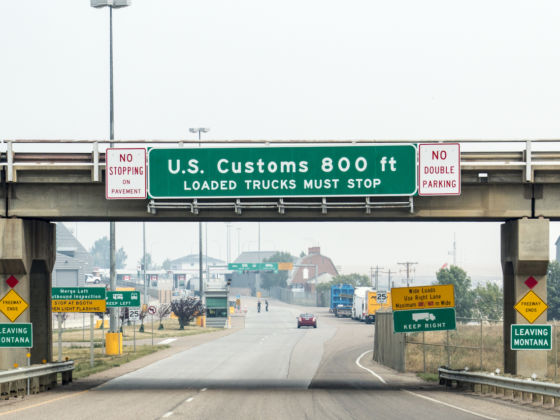There’s a long list of items to verbally declare or decline that you’re carrying when driving through the Canadian border. When I entered Montreal on my first trip there from New York, a friendly Canadian border patrol agent greeted me with, “Bonjourhi,” the French-English mashup of hello in French-speaking Canada. Then came the list of prohibited items.

What Happens When You Accidentally Drive to the Canadian Border With Cannabis
He started with alcohol and tobacco before moving on to guns, knives, bombs, torture devices, and weapons of any sort. Finally, he reached cannabis and other drugs. When we said no, he double checked and clarified that by cannabis he meant anything that could be referred to as weed, marijuana, edibles, gummies, creams, joints, THC drinks, patches, vaporizers, or cannabis gas masks (“They’re doing everything these days,” he said, chuckling). My fianceé and I chuckled back (Why would we bring cannabis into Canada where it’s legal?) and he let us on our way.
The return trip past the United States border patrol was much the same but less jolly and with more questioning about why our license plate read Indiana but we said our home is New York City (it was a rental).
These lines of questioning on both sides are no joke, and it’s only become more intense since Canadians got their first taste of legalized recreational cannabis in late 2018. If you arrive on either side of the border with cannabis in your car (let’s say accidentally for the purpose of this article), you can be subject to being searched, fined, detained, and kept from entering the country. This is as true when going to and from legal recreational cannabis states (Washington, Michigan, Vermont, and Maine) as it is for non-recreational states (Idaho, Montana, North Dakota, Minnesota, New York, and New Hampshire).
The intensity of questioning is all about your answers. Reports by the Canadian Broadcasting Corporation found that Canadians were banned from entering the US after admitting to consuming cannabis at some point in the past — regardless of how long ago it was. Border agents have a lot of power over who gets searched, who gets through, and who is turned around or detained. The Canadian government, according to the CBC, warned that “previous use of cannabis, or any substance prohibited by US federal laws, could mean that you are denied entry to the US.” (Similar to how Canada can restrict access for any American who has had a DUI in the past five years.) Today, the Canadian government has a disclaimer on the risks of international travel on the country’s advisories website:
“You could be denied entry at your destination country if you have previously used cannabis or any substance prohibited by local laws,” the statement reads. “You could also be denied entry to other countries in the future.”
In an October 2018 press conference, Christopher Perry, director of field operations in Michigan for Customs and Border Protection, said that evaluating whether or not a Canadian who has used cannabis in the past will be permitted to enter the US is “a case by case decision based on what is presented to the officer.” CBP can’t refuse to let a US citizen back into the country, but the officer can decide to take someone in for questioning or further inspection. It’s authority to detain or deny non-US citizens they suspect of being previous drug users comes from USC 1182.
So what do you do if you reach the border and suddenly remember that pack of edibles in the glove department? Your best bet is to answer the border patrol agent truthfully. You’ll lose your goods and might have your car searched, but giving it up before crossing the international border will prevent further headaches the next time you cross by car.